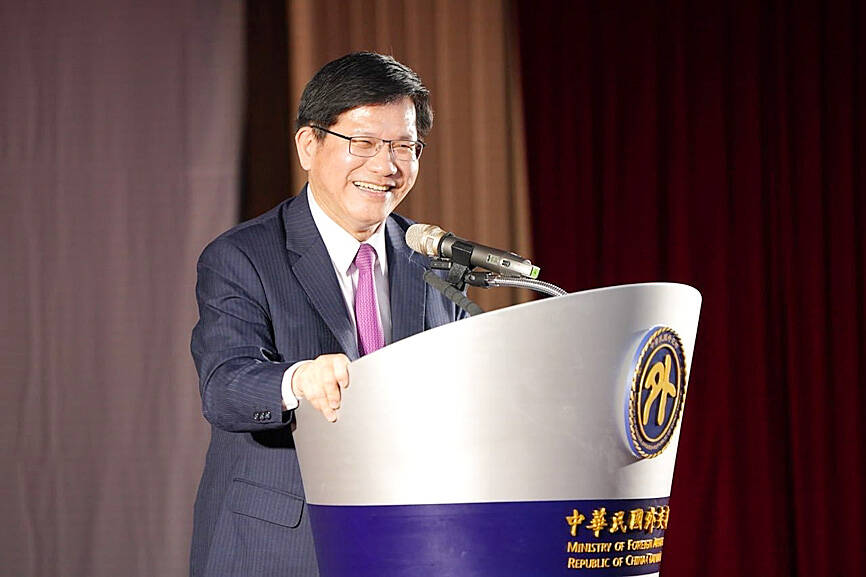Minister of Foreign Affairs Lin Chia-lung (林佳龍) and National Security Council Secretary-General Joseph Wu (吳釗燮) were in the US this week for closed-door meetings with US officials, the Financial Times reported on Thursday.
Wu and Lin were in the Washington area for talks through a format called the “special channel,” the newspaper cited unnamed sources as saying.
Although the “special channel” was first disclosed by the Financial Times in 2021 when Wu met his US counterpart, senior officials from Taiwan and the US have used the mechanism for years to hold talks, it said.

Photo courtesy of the Ministry of Foreign Affairs
The US government has kept the channel secret to avoid butting heads with Beijing, known for strenuously protesting any sign of diplomatic engagement between Taiwan and other states, it said.
Wu and then-council secretary-general Wellington Koo (顧立雄) met with US officials during the previous “special channel” in February last year, it said.
The security dialogue is usually conducted in the area surrounding Washington, as long-standing practice prevents the nation’s foreign and defense ministers from entering the capital, it said.
Sources did not disclose the location or timing of the talks, the Financial Times said in its report.
The Taipei Economic and Cultural Representative Office declined the paper’s request for comments, as did the White House.
The special channel is “one of the most sensitive and important mechanisms in global politics today,” Evan Medeiros, a senior fellow at Georgetown University’s Initiative for US-China Dialogue on Global Issues, was quoted as saying.
“The meeting comes at a critical time given Taiwan’s recent election. Clear and consistent communication between Taipei and Washington is essential, especially as People’s Republic of China pressure grows,” Medeiros said.
The “special channel” was important due to limits on contact allowed by the unofficial relationship between Taiwan and the US, the newspaper cited Project 2049 Institute chairman Randall Schriver as saying.
“A lot of people have the impression that [Chinese People’s Liberation Army] military activity spikes around events like the [former US House of Representatives speaker Nancy] Pelosi visit or [presidential] inaugurations, and then enters a normal and steady status quo, but the PLA continues to do more things and evolve. We are seeing more nighttime exercises and things like air-to-air refueling on the eastern side of Taiwan,” Schriver was quoted as saying.

Alain Robert, known as the "French Spider-Man," praised Alex Honnold as exceptionally well-prepared after the US climber completed a free solo ascent of Taipei 101 yesterday. Robert said Honnold's ascent of the 508m-tall skyscraper in just more than one-and-a-half hours without using safety ropes or equipment was a remarkable achievement. "This is my life," he said in an interview conducted in French, adding that he liked the feeling of being "on the edge of danger." The 63-year-old Frenchman climbed Taipei 101 using ropes in December 2004, taking about four hours to reach the top. On a one-to-10 scale of difficulty, Robert said Taipei 101

Nipah virus infection is to be officially listed as a category 5 notifiable infectious disease in Taiwan in March, while clinical treatment guidelines are being formulated, the Centers for Disease Control (CDC) said yesterday. With Nipah infections being reported in other countries and considering its relatively high fatality rate, the centers on Jan. 16 announced that it would be listed as a notifiable infectious disease to bolster the nation’s systematic early warning system and increase public awareness, the CDC said. Bangladesh reported four fatal cases last year in separate districts, with three linked to raw date palm sap consumption, CDC Epidemic Intelligence

Two Taiwanese prosecutors were questioned by Chinese security personnel at their hotel during a trip to China’s Henan Province this month, the Mainland Affairs Council (MAC) said yesterday. The officers had personal information on the prosecutors, including “when they were assigned to their posts, their work locations and job titles,” MAC Deputy Minister and spokesman Liang Wen-chieh (梁文傑) said. On top of asking about their agencies and positions, the officers also questioned the prosecutors about the Cross-Strait Joint Crime-Fighting and Judicial Mutual Assistance Agreement, a pact that serves as the framework for Taiwan-China cooperation on combating crime and providing judicial assistance, Liang

US climber Alex Honnold left Taiwan this morning a day after completing a free-solo ascent of Taipei 101, a feat that drew cheers from onlookers and gained widespread international attention. Honnold yesterday scaled the 101-story skyscraper without a rope or safety harness. The climb — the highest urban free-solo ascent ever attempted — took just more than 90 minutes and was streamed live on Netflix. It was covered by major international news outlets including CNN, the New York Times, the Guardian and the Wall Street Journal. As Honnold prepared to leave Taiwan today, he attracted a crowd when he and his wife, Sanni,